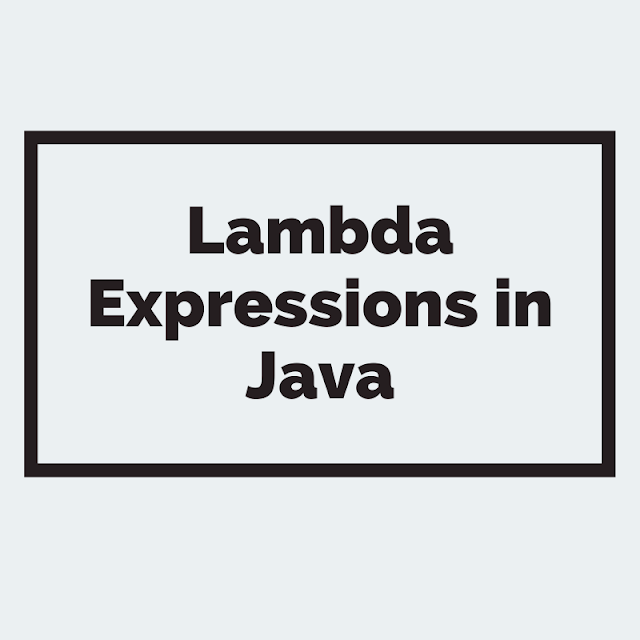Lambda Expressions in Java
What is Lambda Expression?
Lambda expression is just anonymous function or we can say nameless function.
Problem Description :
Write the following methods that return a lambda expression performing a specified action:
- PerformOperation isOdd(): The lambda expression must return true if a number is odd or false if it is even.
- PerformOperation isPrime(): The lambda expression must return if a number is prime or if it is composite.
- PerformOperation isPalindrome(): The lambda expression must return if a number is a palindrome or if it is not.
See full description on HackerRank :
Sample Input and Output :
Input
1 4
2 5
3 898
1 3
2 12
Output
EVEN
PRIME
PALINDROME
ODD
COMPOSITE
The first integer specifies the condition to check for (1 for Odd/Even, 2 for Prime, or 3 for Palindrome). The second integer denotes the number to be checked.
So lets jump on solution
import java.io.*;
import java.util.*;
interface PerformOperation {
boolean check(int a);
}
class MyMath {
public static boolean checker(PerformOperation p, int num) {
return p.check(num);
}
public PerformOperation isOdd() {
return (num) -> (num % 2 != 0);
}
public PerformOperation isPrime() {
return (num) -> {
for (int i = 2; i <= num / 2; i++) {
if (num % i == 0) {
return false;
}
}
return true;
};
}
public PerformOperation isPalindrome() {
return (num) -> {
String str = num + "";
String newStr = new StringBuffer(str).reverse().toString();
return str.equals(newStr);
};
}
}
public class Solution {
public static void main(String[] args) throws IOException {
MyMath ob = new MyMath();
BufferedReader br = new BufferedReader(new InputStreamReader(System.in));
int T = Integer.parseInt(br.readLine());
PerformOperation op;
boolean ret = false;
String ans = null;
while (T-- > 0) {
String s = br.readLine().trim();
StringTokenizer st = new StringTokenizer(s);
int ch = Integer.parseInt(st.nextToken());
int num = Integer.parseInt(st.nextToken());
if (ch == 1) {
op = ob.isOdd();
ret = ob.checker(op, num);
ans = (ret) ? "ODD" : "EVEN";
} else if (ch == 2) {
op = ob.isPrime();
ret = ob.checker(op, num);
ans = (ret) ? "PRIME" : "COMPOSITE";
} else if (ch == 3) {
op = ob.isPalindrome();
ret = ob.checker(op, num);
ans = (ret) ? "PALINDROME" : "NOT PALINDROME";
}
System.out.println(ans);
}
}
}
Solution Explanation :
- We need to create three new functions 1. isOdd() 2. isPrime() 3. isPalindrome().
- In isOdd() function, we have to check given number is odd or not. So basically if number is divisable by 2 it means number is not Odd so return false otherwise true.
- In isPrime() function, We have to check number is prime or not. A prime number is a number that is divisible by only two numbers: 1 and itself. So, if any number is divisible by any other number, it is not a prime number.
- we are looping from 2 to num/2. It is because a number is not divisible by more than its half.
- In isPalindrome() function, We have to check number is palindrome or not. A palindrome number is a number that is same after reverse.
- For that we are storing num as String. After that reverse that number using StringBuffer reverse() method. and check both number using equals() method.
Happy Coding...
Other HackerRank Problems and Solutions with Examples :
- Varargs in Java HackerRank Solution | Varargs in Method Overloading and Overriding
- Subarray Division HackerRank solution in Java with examples

Comments
Post a Comment